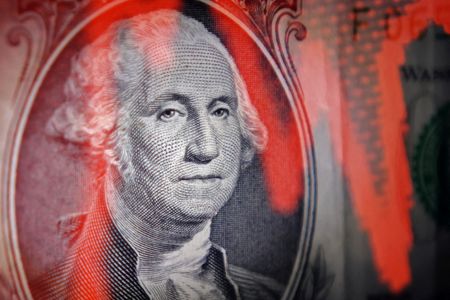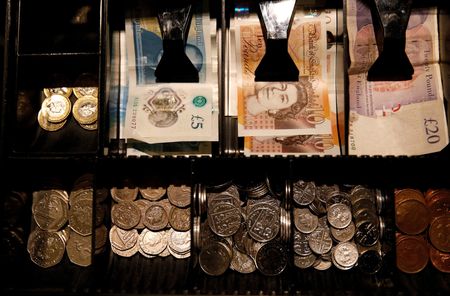By Sarupya Ganguly
BENGALURU (Reuters) -The U.S. dollar will weaken over coming months as market participants ponder the Federal Reserve’s future independence and how many more rate cuts it may deliver, a Reuters survey of foreign exchange strategists showed on Wednesday.
The greenback, down nearly 10% against a basket of major currencies this year, has been the worst performer among them. The short-dollar trade has dominated FX markets since late March, according to Commodity Futures Trading Commission data.
Worries about the inflationary impact of tariffs, an enormous tax cut and spending law and repeated White House attempts to interfere with the world’s most powerful central bank have reversed the dollar’s fortunes after a multi-year run of strength.
A weaker dollar trend will likely persist in the near-term as interest rate futures show markets fully pricing in two Fed cuts this year and possibly another in early 2026.
Nearly 80% of respondents, 39 of 50, said net-short bets would either rise further by end-September or remain around current levels, according to the August 29-September 3 Reuters poll.
The remaining 11 said short bets would decrease. No one chose “a reversal to net-longs.”
“A big risk is the fact everybody seems to think the dollar is likely to weaken, which means that positioning is all one way. That’s sometimes a factor that should make us a little bit more wary,” said Jane Foley, head of FX strategy at Rabobank.
“If we get a lot of inflationary news from the U.S., there certainly would be room for pullbacks in favor of the dollar.”
FX strategists in Reuters polls, who have broadly accurately predicted the dollar’s slide this year, forecast the euro, currently $1.17, to climb steadily to a median $1.18 and $1.19 in three and six months respectively.
It was then predicted to trade at $1.20 in a year: the highest survey median since September 2021.
In the meantime, U.S. President Donald Trump’s repeated pressure on Chair Jerome Powell to slash rates to 1% and his efforts to oust Fed Governor Lisa Cook over mortgage fraud allegations are testing the boundaries of presidential power.
Trump’s Fed board nominee Stephen Miran, chair of the Council of Economic Advisers, has called for sharply lower rates, argued tariffs have little inflationary impact, and proposed Fed governance reforms that would give the president greater control, including the power to dismiss its leadership at will.
“The dollar will face some pressure to soften into the end of the year and it’s going to be a function of two things: one, a resumption of the Fed’s rate-cutting cycle and second, the market’s questions with regard to the Fed’s independence,” said Paul Mackel, head of FX research at HSBC.
(Other stories from the September foreign exchange poll)
(Reporting by Sarupya Ganguly; Polling by Shaloo Shrivastava and Jaiganesh Mahesh; Editing by Hari Kishan, Ross Finley and Nick Zieminski)











